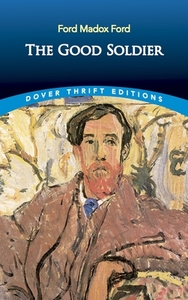Take a photo of a barcode or cover
challenging
slow-paced
Plot or Character Driven:
Character
Strong character development:
No
Loveable characters:
No
Diverse cast of characters:
No
Flaws of characters a main focus:
Yes
emotional
reflective
medium-paced
Plot or Character Driven:
A mix
Strong character development:
Complicated
Loveable characters:
No
Diverse cast of characters:
N/A
Flaws of characters a main focus:
Yes
This one was astonishingly good. Tragedies upon tragedies. Just so good.
- from the jacket: "One of the most important works of twentieth-century British Literature, the Good Soldier addresses the lives and interrelationships between two couples: one American, one British. A tragicomic novel of manners, in whih John Dowel narrates the disintegration of both his own and another marriage, the work's depiction of passion and intrigue offers an ironic reading of Edwardian-era values."
emotional
reflective
sad
medium-paced
Plot or Character Driven:
Character
Strong character development:
Yes
Loveable characters:
Complicated
Diverse cast of characters:
No
Flaws of characters a main focus:
Yes
Ford has ambitiously set out to expose more than just the yearnings of conflicted lovers, but rather unearth insight into the moral complexities that rationalise their motives and decisions. As it approaches this narrative through the eyes of an "involved party", Ford encourages us to question its bias, whether the shared insight into its story and characters are shaped by objective authenticity or whether the narrator himself has created a confessional to justify and reinforce his own means. Much like the characters themselves, the manner of its storytelling is a reflection of his own frailties to unfold this story, with Ford managing to reflect the zig-zag nature of thought recollection (which on its own managed to frustrate and intrigue me simultaneously). There was enough of its story that encouraged me to endure through it to the end, though Ford did make the process rather difficult with its choice of narration - despite its deliberateness - and I do wonder that now I am aware of how it all unfolds and my feelings towards its approach of telling it, whether that impression will change upon a subsequent read. Undoubtedly, there is a layer to this that I have yet to grasp and that lingering thought has always questioned my own initial response to this. However, how I currently feel is how it simply is.
mysterious
reflective
medium-paced
Plot or Character Driven:
A mix
Strong character development:
Complicated
Loveable characters:
Yes
Diverse cast of characters:
No
Flaws of characters a main focus:
Yes
The Good Soldier is an intense tale of the complexity of post-Victorian emotional repression. With a collection of entirely despicable characters, it is somewhat refreshing to know that we live in a society that is somewhat openly over-sexualised, instead of in the hellhole of despair that existed in the early 1900s that was under-sexualised, and therefore even more liable to befall upon adultery and deceit in an explosion of desperation for passionate exposure. Ford Madox Ford certainly has a way with words; his beautiful choice of linguistic devices and upper class vernacular exposes the reality behind this harrowing 'inspired-by-true-events' account. The problems with it are that sometimes the novel is simply too complex. Although the narrator does recognise this, and he perfectly justifies his reasoning for the use of this peculiar technique of story telling; the events seem to 'to-and-fro' between dates and characters, which sometimes begin to twist the story down a path of amnesiac nonsense. With one sentence being set in a certain time, and another being set in an event that took place a few years before, this twisting path of confusion dwells more in a forest of misunderstood mist than in an open field of appreciated clarity. Nevertheless, The Good Soldier is a beautifully written novel (one feels most elegant to read it), and where it falls on, perhaps, context, it rises and succeeds with its literacy.
this is not a war book. it’s an onion. it has layers. confused? me too. a little awed? yup. distrusting of the narration? absolutely.
Wow. I thought this was probably going to be something along the lines of Jane Austen. I could not have been more wrong. Well, maybe Austen crossed with Freud. Quite intriguing and evocative of its era and its author's country of origin. It's not a "can't put it down" kind of book, but it's certainly interesting from literary and psychological perspectives.


